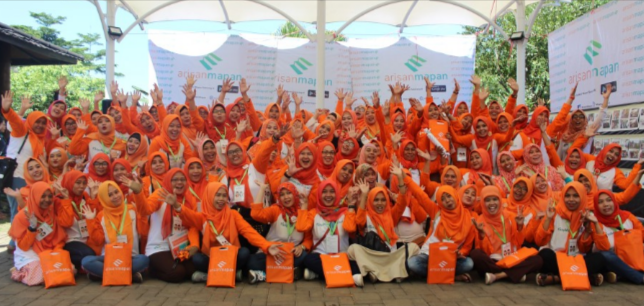Flourish and Patamar re-teamed to invest in Mapan’s community of digital saving circles
In 2009, smartphones were a mostly untapped invention – and had not yet reached many emerging markets like Indonesia. Nevertheless, a small group of Indonesian entrepreneurs had the idea to deliver low-cost financial services via mobile phones. With a vision ahead of its time, they built Mapan, a digital network that today helps more than 3 million families afford household goods by saving together.
Mapan builds on a local, long-established custom in Indonesia of rotating savings groups, traditionally run by women. Their app helps women afford a broader range of household products, better organize their savings groups, and earn income while doing it.
Called “arisan” in Indonesia, rotating savings and credit associations (ROSCAs) are one of the most common informal financial solutions across the emerging world. Women in the community meet weekly or monthly, and each contributes to a shared savings pool. The ability to purchase large ticket essentials rotates through the group. Salespeople often visit the arisan during the group’s regular meeting to sell their wares.
In Indonesia, where the monthly minimum wage is about USD $200 and half the people are unbanked, simple items like furniture, electronics, or cookware can be a large outlay for most families. With formal credit unavailable and informal credit highly expensive, arisans are a responsible and effective way to save.
Mapan encourages this financially healthy habit of saving rather than taking on debt. While debt (when made affordable) can be a useful instrument for financial inclusion, savings is as well, and avoids the risk of customers overextending themselves. Then rotating savings circles multiply the power of individual savings.
Digital Tools for Women Leaders
Flourish first invested in Mapan in 2011 when the company was called Ruma, alongside Patamar Capital, Southeast Asia’s leading impact venture firm. When it was founded, Ruma offered simple payments and credit on feature phones, while enabling shopkeepers at warungs – Indonesia’s corner stores – to earn money as local agents for airtime top-up.
In 2015, Ruma launched the Mapan app, to provide fintech services and digital tools for arisan, while following the same model of empowering people in their communities to earn income. Mapan’s app makes it easier for the women who organize their arisan (mitra usaha mapan or MUMs) to manage the group.
The app replaces their paper notebook and uses a random algorithm to determine when it is each member’s turn to make a purchase with the collective savings. MUMs no longer need to convince others to buy the same item for a discount. With Mapan, each member can buy whatever they want from a larger catalog, for higher quality and lower prices.
MUMs also earn commissions for organizing new groups. For about 60% of arisan group leaders, Mapan is the only source of work they have. They are mostly mothers and homemakers who cannot afford childcare in order to work outside the home. Mapan’s app enables them to work from home, and 90% of MUMs report their quality of life has improved, they have increased their family’s income, and they feel more confidence in themselves.
A 14-Year Journey of Fintech Innovation and Inclusion
As an app, Mapan’s community-based approach helps women become leaders in their neighborhoods and promote financial literacy within their communities by forming arisan groups. As a company, Mapan has taken an unusual journey to its current mass market success.
Shortly after the Mapan app was launched, Ruma was acquired by Indonesian super-app Gojek, and Flourish and Patamar exited our 2011 investment. In 2022, Gojek and Ruma saw mass market potential and a higher chance of growth for the Mapan business as an independent company with the ability to do its own larger fundraising. When the company spun off from Gojek as part of this plan, Flourish and Patamar were excited to participate again as investors in its new Series A round.
Over 10 years later, and now that smartphones are nearly ubiquitous across Indonesia, the Mapan team can realize the full potential of their vision for financially empowering people with simple but powerful digital tools.
Mapan’s first move as an independent company has been to expand the range of products its offers to arisans, by partnering with more high-quality suppliers. The leadership team, led by CEO Ardelia Apti, aims to make Mapan available to 10 million Indonesian households by 2026.
Apti herself has had a special journey with Mapan. She first joined the company in 2014 as an intern, while still in college. She then started her career at McKinsey & Company and spent several years working with the GoTo group and GoPay, Gojek’s fintech business. Now, she is focused on strengthening Mapan’s financial position and expanding its coverage to more women in Indonesia.
As a woman leading a company focused on women’s empowerment, Apti has a personal sense of what drives women to contribute to their family’s income, and their aspirations within tight-knit communities.
A Vision for Overcoming Obstacles to Women’s Aspirations
With most of Indonesia’s population still unbanked, Mapan still has tremendous potential to open new opportunities for women and their families. Its community-based approach is a powerful bridge to building trust in traditional finance and economic empowerment.
And Mapan’s customers already understand how arisans work, because the rotating savings practice has long been prevalent in Indonesian culture. Flourish and Patamar see so much potential in Mapan because it digitizes an existing customer behavior, rather than trying to drive behavior change.
We are proud to support the mission-driven team at Mapan, and a collective savings tool shaped by over a decade of technological evolution and learning how best to meet the needs of underserved users.
